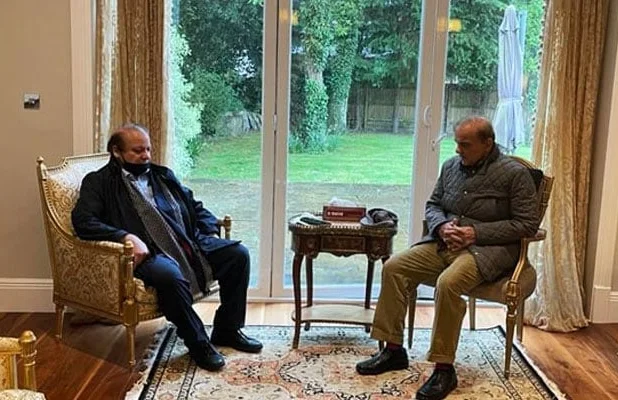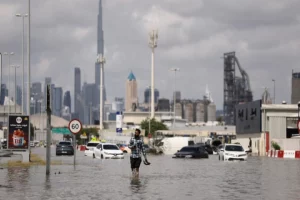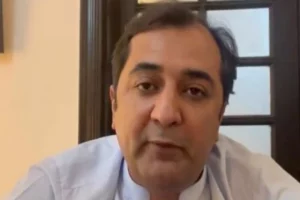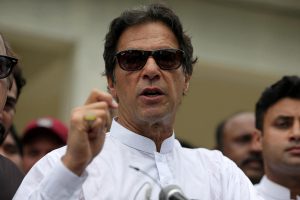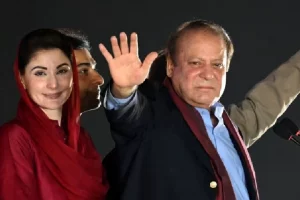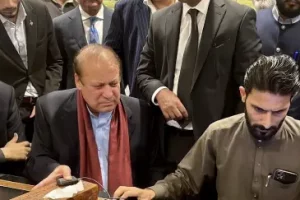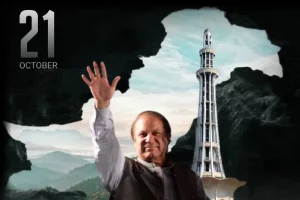The Pakistani media is rife with speculation on what is transpiring in Dubai between the two main political parties the Pakistan Muslim League-N (PML-N) and the Pakistan Peoples Party (PPP). The Pakistan Tehreek-e-Insaf (PTI) – the third major political party headed by former prime minister Imran Khan, now seen as a trouble-maker, is out of the reckoning.
As judicial battles continue in Islamabad, Dubai – the commercial heartbeat of the United Arab Emirates (UAE), has become Pakistan’s arena of politics and intrigue.
The stalwarts to descend on Dubai include Nawaz Sharif from London, his daughter Maryam Nawaz, PPP co-chairperson Asif Ali Zardari and son Bilawal Bhutto-Zardari, senior party members from both parties as well as representatives of the newly-formed Istehkam-e-Pakistan Party (IPP).
Imran Khan’s shadow
The priority among the ruling coalition is how to win back the trust of the people, who seem to have disproportionately sided with Imran Khan after he had been removed from the top position in 2022. With elections approaching, the parties are keen that they get the confidence of the people and that Pakistan is seen to be run by democratic political forces that enjoy the people’s mandate.
Experts believe that the political parties are discussing possible electoral permutations and combinations once Imran Khan is disqualified and his party PTI no longer poses a political threat. The two ruling parties are envisaging that the elections will happen smoothly without the PPP and the PML-N posing a threat to each other – in other words demonstrate before the people and the world that the country’s democratic institutions are back on the revival path.
Columnist and television anchor Javed Choudhry has claimed that the two big parties are also discussing potential seat adjustments.
Nawaz Sharif’s comeback
With Nawaz Sharif as the big daddy among the Pakistani political elite, it is being speculated that he will return to Pakistan within July, clear his name from various cases and kickstart his party’s electoral campaign. The onerous burden of rehabilitating Nawaz is on the shoulders of his brother Pakistani Prime Minister Shehbaz Sharif, who has to demonstrate political acumen by ensuring that the International Monetary Fund (IMF) pay-out the promised bailout loans.
Any such deal, which had almost been scuttled by the IMF will put the Sharif family of Shehbaz, Nawaz and Maryam in pole position and help restore confidence before the all-important elections. It also gives the Sharif family a trumpet to blow on how the Pakistani economy dived because of Imran Khan and how the family has been able to salvage it through the bail-out loan.
Reviving a battered economy
The Dubai discussions are also focused on how to revive the ailing economy. The Shehbaz government in consultations with the army had set-up the Special Investment Facilitation Council (SIFC) only last week to begin the process of selling off State assets to friendly Gulf countries to raise forex reserves.
The parleys in Dubai seem to suggest that once the elections are tackled, the coalition will lay out a roadmap to improve the economy.
At the moment, the aim is to persuade the IMF for the funds, raise money from the diaspora and see if the Gulf countries would be interested in corporate farming in return for funds.
Support from the army
With a badly bruised army standing solidly behind the ruling coalition, the triad is now pushing the narrative that Imran Khan’s party was behind the attacks on nearly 200 military installations and properties including the ‘Shuhada’ – the martyrs’ memorial. They also claim that the violence was not a spontaneous outburst by Imran Khan supporters but a pre-planned conspiracy by Imran Khan and his senior party members to grab power through violence.
The focus of the army’s latest press conference was not just the violence perpetrated by the common people. It also extensively spotlighted the army’s investigation against its own officers cutting across ranks to ensure that anyone, high or low in the Pakistani social pecking order was held accountable.






